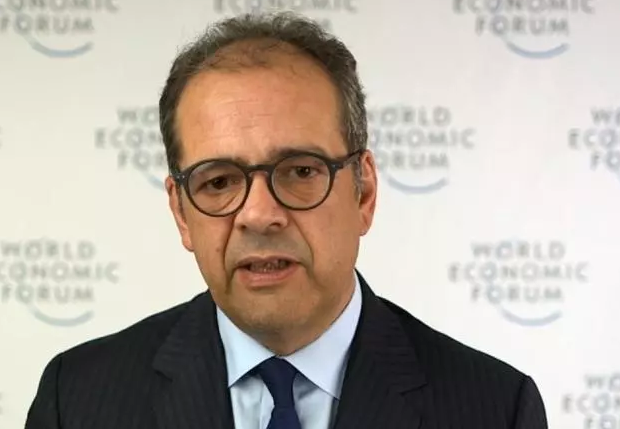Arnaud Bernaert, the World Economic Forum’s head of Global Health and Healthcare, has more than 20 years of experience in the healthcare industry. Prior to joining the Forum Bernaert was a senior vice president at Royal Philips, in charge of global strategy. He also served as the European Regional Controller for Baxter, a Fortune 500 American health care company. He recently spoke to The Innovator about the Forum’s COVID Action Platform and the need to speed up the digital transformation of the global healthcare system’s response to pandemics by applying the platform business model to the distribution of essential supplies.
Q: How did the Forum get involved in combating the pandemic?
AB: After the Ebola virus outbreak in West Africa we started a number of initiatives in an organization we set up called the Epidemic Readiness Accelerator. One of these initiatives, concerning vaccines, was extremely successful and led to the creation, at the Forum’s annual meeting in Davos in 2017, of the Coalition for Epidemic Preparedness Innovations (CEPI). CEPI brings together experts from government, business, health, academia and civil society to accelerate the development of vaccines against emerging infectious diseases and to enable access to these vaccines during outbreaks. Some $460 million in initial funding was provided by the Bill & Melinda Gates Foundation, the Wellcome Trust and the governments of Germany, Japan and Norway, and further commitments were made to create a total of $800 million. Working in partnership with WHO (the World Health Organization) we used this money to fund the work of startups and large corporations in areas where there were no market incentives for research into new vaccines [ such as Lassa virus, Nipah virus, Rift Valley Fever virus and Chikungunya virus]. At the annual meeting in Davos this year the coronavirus was just starting to get known to the world. We realized that we could mobilize all of our existing accelerator work streams very rapidly but the limitation was that we could only tap into a relatively small base of already involved corporations. That’s why we decided to create the COVID Action Platform, which was launched three weeks ago. It has three main goals. The first one is to galvanize a community of large industry participants; the second one is to help define better solutions for business continuity and the protection of employees and livelihood and the third one allows companies to offer a project or initiative that could make a difference in the COVID-19 response by donating products or financial resources. There are many ways to engage.
Q: What kind of progress has there been to date?
AB: Already almost 400 companies have joined the platform. Many are partners of the WEF but we have also opened the platform to non-partners. We have a call every Wednesday to help accelerate the projects they are working on and connect them to potential partners with the goal of creating public-private partnerships. In the first week we received 80 proposals. Not all of them were necessarily areas for the Forum to work on but many are. One of the coalitions being formed addresses the worry about how the crisis will impact Africa. The social distancing measures take in areas like China are not going to be repeatable in Africa, particularly in regions where people don’t have refrigerators at home, preventing them from stockpiling food supplies. If government close markets it could result in starvation and rebellion so it is important to define socially acceptable measures for Africa. That is why a public-private coalition has been formed on our platform that involves The African Center For Disease Control, IPSOS, a research company and a partner of the Forum, and an NGO called Resolve to Save Lives which operates on the ground in villages. A formal agreement was delivered in less than four days to IPSOS asking them to poll opinions in more than 40 countries in Africa on what type of social distancing could work best from a cultural point of view. At the same time the coalition is employing AI capabilities to the monitoring of cell phone-based applications usage and using geopositioning technologies so that measures will be in place to monitor the effectiveness of these guidelines on the ground. This will allow governments to continuously improve social distancing requirements and verify their impact. These learnings can also be applied to Latin America as the coronavirus spreads there. This is an example of the type of action that can be achieved but there are many more. There are companies that are willing to mobilize drone delivery capability in the U.S. to deliver protective equipment and more generally reduce exposure to the virus. It is still early but there are many promising initiatives.
Q: What about the development of a COVID-19 vaccine?
AB: CEPI just announced it will be investing an initial $620,000 in a partnering agreement with The University of Hong Kong to rapidly develop a vaccine candidate against COVID-19. That project is its seventh COVID-19 vaccine initiative. The first CEPI Phase 1 study for a COVID-19 vaccine has already began vaccinating volunteers. There are no guarantees of success but the hope is that a safe and effective vaccine will begin to become available for individuals at greatest risk within the next 12–18 months.
Q: Ventilators are needed to help severely ill coroanavirus patients breathe. There is shortage in hospitals across the world. Can the COVID Action Platform help?
AB: Ventilators are a relatively small market and are built by less than a dozen companies. The larger ones include Medronic, Philips, General Electric and Drägerwerk in Germany. Collectively they are probably capable of manufacturing 40,000 ventilators annually. These partners have managed to actually significantly increase ventilator manufacturing by redirecting manufacturing lines in their factories. Realistically I think this is the most promising avenue. The problem is not lack of assembly lines. The main issue is access to critical components. The European Commission has made a very clear statement that the main priority is to help existing manufacturers to scale up rather than getting non-industry participants to enter that space. We are very aware that the auto industry and even makers of vacuum cleaners are trying to create additional capacity but we are also very worried that getting these ventilators duly qualified for clinical purposes won’t be possible before the end of the crisis. The view of the European Commission is that it is better for the incumbents to increase supply rather than encouraging everyone to make ventilators and causing even more of a shortage on components and we share that view.
Q: What about other equipment shortages such as masks and hygiene products?
AB: Astra Zeneca, one of the Forum’s partners, has very generously donated nine million surgical masks. The first shipment has been sent to Italy and more shipments are being prepared as we speak. We also have state-owned companies in China ramping up manufacturing of masks. China can at this point deliver 150 million masks per day or one billion per week.
Unilever has donated the equivalent of $50 million euros in hygiene supplies — -mostly soaps — -but we realized that it is very difficult to organize that donation and match such a massive volume with individual needs and requests. All of these efforts are being handled in an archaic fashion; you learn anecdotally about the need in one country and then deliver to one central warehouse. We need a platform to make that contact happen and to coordinate logistics and to automate everything. Retailers like Amazon and Alibaba have been doing this for years but now this has to happen in the field of healthcare. That is why we are working with WHO on an Amazon-like marketplace for protective equipment and emergency supplies. The only difference with Amazon’s marketplace is that this one has to have an allocation engine to allow WHO to prioritize needs. Alibaba, Amazon and Microsoft are all engaged. It saves a lot of time to be able to use existing IT infrastructures instead of having to create them from scratch. Thankfully we are receiving a lot of support from our existing partners.
Q: How else can technology help bring the international healthcare community into the digital age?
AG: The global supply chain needs good forecast modeling. And since pandemics evolve in waves we need to find better ways of sharing data and learning from neighboring countries . We are trying to build a network of large health care delivery networks and get them to exchange best practice on health care protocols and compare notes. Rather than having one global monolithic system it is better to have multiple health networks communicating globally with the WHO doing the coordination.
Q: How can interested companies join the COVID Action Platform?
AB: Any interested company can join. They do not have to be a Forum member. Just go to the Forum’s web site, answer the COVID Action Platform questionnaire, you will be granted access to our internal Toplink network where we do the project management and you can submit your proposal. We are trying to make it simple to engage.
To access more of The Innovator’s Interview Of The Week articles click here.







